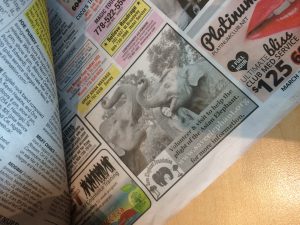Save the Asian Elephants

Save the Asian Elephants
This advertisement was in the back of the Georgia Straight Newspaper published in March 2017. I found it in the back few pages in the classified ads along with all the “Thai and Asian massages” The advert is promoting an organisation that offers a from of socially responsible tourism. The organisation sets up transport, accommodation and activities at their elephant park. Guests pay the expenses and then volunteer time working at the park based in Northern Thailand. Their goal according to their website is to “…has always been to provide a sanctuary and rescue centre for elephants.” The organization also allows American residents to sponsor an elephant by donating money, without having to leave their home. Tourists are not only promised an immersive experience into the Thai wildlife but also a “visit [that] helps to improve the lives and conditions of elephants” (Save Elephant Foundation).
This organization is not only a way to keep elephants safe but also a way for Western travellers to travel while feeling like the are being socially responsible and making a difference. Mahrouse describes it as, “various tourism options under the descriptors of ‘ethical,’ ‘eco’, ‘volunteer,’ and ‘charity’” (Mahrouse 373). Although tourists may feel like they are fully immersing themselves in authentic Thai wildlife an culture, the organization is very much set up to have the purpose of serving the Western Tourists needs, whether that be moral satisfaction or natural beauty. This is evident by the fact that firstly it is being advertised in a Vancouver newspaper. It is asking Canadians to come over to Thailand and help fight against the distinction of elephants. The word help elicits a sense of responsibility and agency to the Western tourist, that they are needed to help the elephants and without them, the plight against elephants will continue. This sense of being a saviour is very common in Voluntourism and this type of “tourism [is] about power as much as it was about pleasure because it served to empower them” (Mahrouse 376). The tourist is in a position of power and privilege to be able to be mobile and go to the destination and have the privilege to be a tourist and “help.”
Not only is the advertisement marketed towards Westerns but also the local Thai workers they employ are part of the branding and experience for the tourist. Firstly the pictures shows a Thai woman smiling looking very happy with two elephants them seems to be very affectionate. It is as if the elephants are thanking the woman for her work and this sense of gratitude shown in the picture is what many tourists seek in the experience. The fact that it is a woman perpetuates the idea that helping and caregiving is a woman’s role and that the sense of caregiving is fulfilling to women.
The fact that the woman is Thai adds a sense that the tourist is immersing themselves into the true Thai experience but that is contrasted by the job requirements posted on the organizations website. To work at the park, one has to be a Thai resident, citizen or passport holder. Although they are Thai the job requires the individual to speak English and to hold a degree in English tourism, sales or design enforcing the idea that “…travel and tourism is invariably and inevitably asymmetrically structured within the globalized world” (Mahrouse 375). The requirement that workers have to know how to care for the westerner, be able to speak English to them and know how to make them comfortable shows that although the tourists are there to help, the priority is the comfort and pleasure of the tourist, reproducing privilege, racial hierarchy and power.
In summary it links to course content by the way tourism is advertised and the way gender and race is portrayed through that.
Citations:
Mahrouse, Gada. “Feel-good tourism: An ethical option for socially-conscious Westerners?.” ACME: An International Journal for Critical Geographies [Online], 10.3 (2011): 372-391. Web. 25 Mar. 2017
Save Elephant Foundation. N.p., n.d. Web. 25 Mar. 2017. <http://www.saveelephant.org/>.
